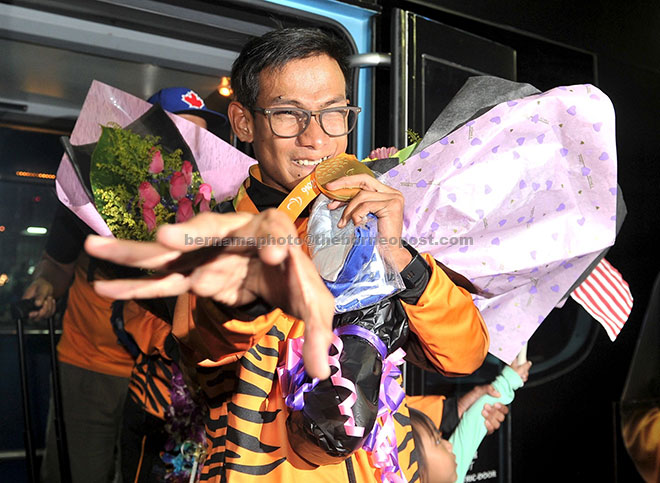
Gold medallist Mohamad Ridzuan Mohamad Puzi reacts to the warm reception upon his return. — Bernama photo
NEVER in the history of Malaysia have we seen such a rousing reception for disabled people. For Mohamad Ridzuan Mohamad Puzi, Muhammad Ziyad Zolkefli, Abdul Latif Romly and Siti Noor Radiah Ismail, the extraordinary heroes’ welcome by Prime Minister Datuk Seri Najib Tun Razak and other VVIPs at the Kuala Lumpur International Airport must have made them feel like they were on top of the world.
That was not all. The sight of people from all walks of life cheering for them in the parade through Kuala Lumpur was extremely heartening. This is our nation’s most successful outing in the Paralympic Games yet. With three gold and one bronze in the bag, they are the pride of the nation and deserve the applause all along the way.
It is commendable of the government to allocate funds to train and develop disabled athletes to their full potential. Disabled athletes are now treated as equals to the non-disabled athletes and receive the same incentives, cash awards and pensions for life when they bring back medals.
This recognition is a breakthrough in the fight for equality. Youth and Sports Minister Khairy Jamaluddin must be credited for implementing this policy in 2013. Before that, disabled athletes were only entitled to 30 per cent of the amount given to non-disabled athletes.
Not to be left out, the private sector joined in to bestow the athletes with cash, condominiums, cars, free flights and more for bringing glory to the country. This recognition from all quarters will certainly spur them to train harder and reach for even greater heights in future competitions.
They have had their moments of glory. They are irrefutably world-class athletes worthy of the attention and the various incentives in cash and kind going their way. Now that they have shown such remarkable results at the international level, disabled people are getting attention more than ever.
After all that back patting, excitement and celebration, we must now take a step back and look at the issues still plaguing disabled people in the country. The question we must ask ourselves is can this euphoria be translated into a rolling momentum towards greater awareness and consequently effect a positive change of mindset and attitude towards disability?
If history is of any indication, the developments after the London 2012 Paralympic Games may provide an insight into this matter. The games then was billed as the biggest and most successful Paralympics ever. Fast forward to four years later, austerity measures by the British government have seen welfare benefits and living allowances for disabled people cut or taken away. This has caused severe hardships to those who depend on these funds to live by. Even British Paralympians were not spared.
Just before the Rio 2016 Paralympic Games, a survey of over 1,000 disabled people in Britain by Scope, a disability charity serving England and Wales, yielded some interesting and eye-opening perspectives. In the report, Scope stated that the respondents “overwhelmingly believe the Games are an opportunity to change perceptions of disability”.
However, closer scrutiny of the statistics showed that there was little or no improvement to the everyday lives of disabled people four years after the Paralympics with a massive 80 per cent saying “there has been no change in the way people act towards them”. Scope concluded that lasting change can only come by making disabled people more visible in society all the time and not only once every four years.
Malaysia has yet to organise a sporting event of this scale but has hosted the 2001 Asean Para Games and 2006 Fespic Games, both of which were international multi-sport events for disabled athletes. From the two events until now, little has changed where accessible facilities, support services and attitudes of the general population towards disabled people are concerned. This scenario parallels the findings by Scope.
Can the success in the Paralympics in Rio this year buck the trend and trigger a change for the better seeing how supportive the government and the people have been towards the athletes as compared to previous times? There is ample evidence that this has already happened, namely the similar incentives and recognition accorded to disabled and non-disabled athletes.
Having said that, we must be mindful of the fact that other than sports, there are many other areas that require support like education, employment and even in activities of daily living for people with severe impairments. The government and private sector should not only provide backing for parasports now that it has become glamorous. Allocation of funds and resources should be distributed more evenly across the board to benefit disabled people in other areas.
Let’s hope that come the next Paralympics in Tokyo in 2020 when our athletes bring back more medals, which I am sure they will, our country would have achieved a commendable degree in equality, inclusivity and accessibility that we can be proud of. We can do more and we should.
The success in sports have started the ball rolling. We must capitalise on that and build on it for other areas where disabled people need support as well.
